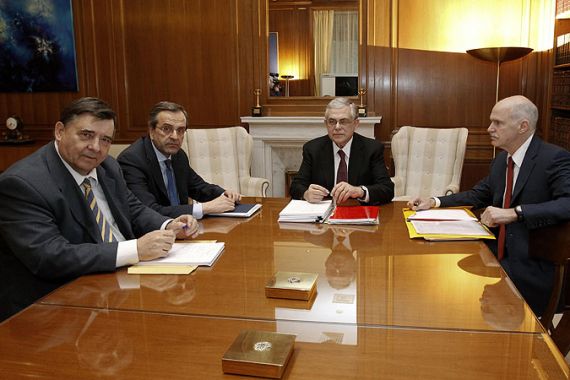Greek leaders hold crucial austerity talks
PM in negotiation with coalition leaders over unpopular measures to get new bailout package to avoid bankruptcy.

 |
| Disagreement remains on the extent of the austerity measures among coalition partners [Reuters] |
The meeting was originally scheduled for 11:00 GMT on Wednesday, but began late to allow the three coalition parties study the draft that the Greek prime minister negotiated with International Monetary Fund, the European Commission and the European Central Bank.
Papademos, an unelected prime minister who was appointed in November to steer Greece through its financial crisis, is seeking to push through financial reforms to secure $170bn in funds from the EU, ECB and IMF – the so-called troika – to avoid a March default on its bond repayments.
Keep reading
list of 4 itemsWhy are nations racing to buy weapons?
Parallel economy: How Russia is defying the West’s boycott
US House approves aid package worth billions for Ukraine, Israel
The troika has demanded further measures to improve Greece’s competitiveness and economic stability, including new private-sector wage and pension cuts, public-sector retrenchments and cuts in health, welfare and defence spending.
Unpopular measures
The Greek government has already accepted that it must cut 150,000 public-sector jobs by 2015 to get the new bailout, and reduce 2012 spending by a further 3.3bn euros ($4.3bn) as well as wage cuts in the private sector by 22 per cent and recapitalise banks.
But the measures are unpopular with many Greeks, with workers staging a 24-hour general strike on Tuesday in protest over the proposals.
Greece’s largest labor union, GSEE, said it would meet on Thursday to consider calling for new protests against the austerity measures.
“They simply don’t care that they are causing such damage to the country and such damage to society,” Stathis Anestis, senior GSEE official, said.
 |
Greeks have already been hit with a spate of salary cuts and increased taxation over the past two years, amid record-high unemployment and a five-year recession.
The cutbacks have already seen unemployment rise to around 19 per cent and poverty to 20 per cent in Greece, according to data from the EU statistics agency Eurostat.
But disagreement remains on the extent of those cuts among coalition partners, who are set to face national elections in late April, after the debt deals have been sealed and implemented.
The new funding is vital if Greece is to avert a debt default on March 20, when it must repay 14.5bn euros [$19bn] to bond holders.
Late on Tuesday, Greece’s private creditors signalled progress on a separate, linked agreement that would cut the country’s privately held debt load by 50 per cent, or some 100bn euros ($131bn).
Representatives of the Institute of International Finance (IIF), which has been leading the talks for private bondholders, had a “constructive meeting” with Papademos, Frank Vogl, an IIF spokesman, said.
Papademos and Evangelos Venizelos, the finance minister, will soon brief the rest of the 17-nation eurozone on the proposed deal, Vogl said.
Finance ministers’ meeting
The meeting of eurozone finance ministers could happen as soon as Thursday in Brussels, according to officials, although that will depend on an agreement in Athens on Wednesday.
|
|
If political leaders accept the demanded austerity, Greek officials say a cabinet meeting will approve the deal, likely later on Wednesday. Parliament will then have to vote on the deal over the weekend.
Greece has been kept solvent since May 2010 by payments from a 110bn euros ($145bn) international rescue loan package.
When it became clear the money would not be enough, a second bailout was decided last October.
Meanwhile, in Luxembourg, the head of the eurogroup finance ministers, Jean-Claude Juncker, said that the ministers may hold talks on the package on Thursday depending on the outcome of negotiations in Athens.
“Tonight at the latest I will decide if a eurogroup meeting will take place tomorrow evening or not,” Juncker said.